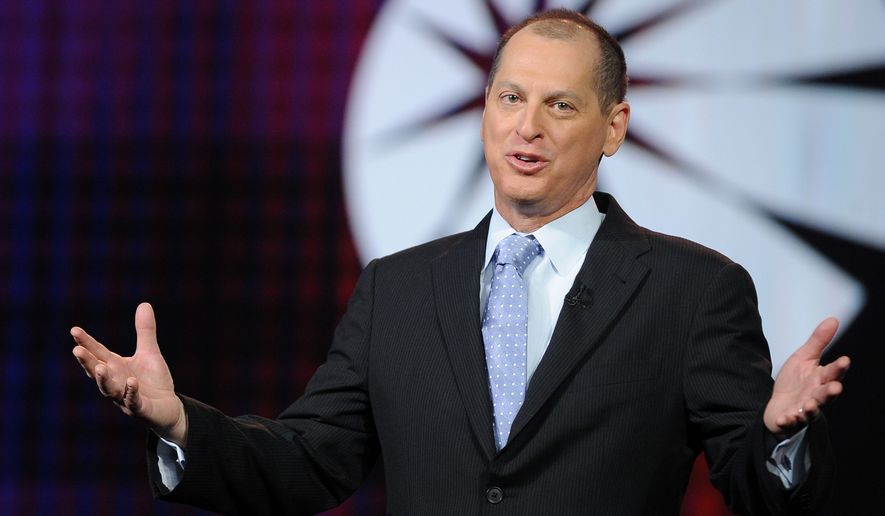NEWSMAKER INTERVIEW:
Technology companies big and small across America warn they will be forced to move operations out of the U.S. if Congress does not move quickly to take on a plague of patent trolls, the head of one of the nation’s biggest high-tech trade groups warned Wednesday.
Gary Shapiro, president and CEO of the Consumer Electronics Association, which represents over 2,000 American technology companies, raised the concerns in an interview with editors and reporters at The Washington Times on Wednesday. CEA members, he said, are buckling under the expense of fighting what he said were bogus patent claims filed by shell companies — the so-called patent trolls — that buy up vague patent ideas and then extort money from legitimate companies through the threat of lengthy and expensive litigation.
“It’s the only issue I deal with where CEOs from the large and the small companies have tears in their eyes, and they say to me, ’This is killing me, it’s killing my time, it’s killing my engineers, it’s killing our productivity as Americans,’” Mr. Shapiro said Wednesday. Patent trolls, CEOs tell him, “’make us want to go overseas with our stuff. We could be hiring other people rather than making lawyers rich.’”
He argued that the bogus lawsuits, which drain roughly $80 billion per year from the U.S. economy, according to a Boston University School of Law study, are a “litigation tax” that puts American companies at a competitive disadvantage with foreign rivals who do not face the same expense.
“This to me is an unconscionable extortion, and it’s only legal in America this way,” Mr. Shapiro said.
Patent reform bills are circulating in both the Senate and the House. Both bills attempt to curb patent litigation by shifting litigation fees to the losing party in a patent case when the judge deems that an argument behind a lawsuit is not reasonable.
The Senate Committee on the Judiciary is set to debate its reform bill Thursday. Although the CEA would prefer the more sweeping House bill, Mr. Shapiro said that a less-sweeping Senate bill would be acceptable given the depth of the crisis.
“We definitely prefer the House bill, but progress is progress, and we applaud efforts to move along, and we are going to be working to support the strongest possible version of this,” Mr. Shapiro said.
But the CEA push faces a number of critics, including the major tech company Qualcomm — a CEA member — and conservative groups such as The American Conservative Union and the Club for Growth.
At least two 2016 GOP presidential contenders, Carly Fiorina and Rick Santorum, also have opposed a crackdown, with skeptics arguing the proposed reforms would weaken property rights, dilute the value of existing patents and harm startups and small innovators.
In a letter sent Wednesday to the top Republicans and Democrats in the House and Senate, a coalition of conservative organizations led by The American Conservative Union warned that the Senate bill would weaken American patents and the ability of independent inventors to profit from their innovations.
“While sponsors and proponents of this legislation claim it is designed to curb abusive tactics in patent litigation, the bill would in fact increase litigation at the expense of innocent inventors,” the letter reads. “The bill’s overly broad provisions apply to all litigants seeking to assert patents, not just ’patent trolls,’ and as a result will severely undercut the ability of inventors to enforce their intellectual property rights, ultimately devaluing patents, stifling American innovation and diminishing our global competitiveness.”
“We urge a scalpel, not a cleaver, in addressing patent revision legislation,” the coalition members wrote.
Mr. Shapiro acknowledged that the courts have come a long way in reining in unfair patent suits, pointing out that even conservative Supreme Court Justice Anthony Scalia has acknowledged the problems caused by patent litigation abuse. But the trade group head said the courts alone will not be able to stop the problem of patent trolls.
“Yes, the courts have definitely helped, but it’s nowhere near what needs to be done if we are going to stop this phenomenal growth,” Mr. Shapiro said. “It costs nothing to be a patent troll — all you have to do is be an out-of-work lawyer.”
And the lawsuits themselves are “just the tip of the iceberg,” according to Mr. Shapiro, who said that the bigger issue is the hundreds of thousands of threatening letters patent trolls send to intimidate small companies to pay up simply to avoid a court fight.
Bigger companies that can afford the costly legal fees can fight the trolls in court, but smaller startups are caught in a lose-lose situation.
“Certainly for big companies this is a problem, and they can afford to spend on lawyers, but for small, publicly traded companies, this is the difference between profit and loss for them. It’s what they are paying on legal fees,” Mr. Shapiro said.
The House Judiciary Committee is moving quickly to revive its reform measure, which passed the House last session by a 325-91 vote but never made it out of committee in the Senate.
President Obama has also expressed support for patent reform and said that patent trolls are one of the “biggest problems” the administration is targeting.
Mr. Shapiro said the CEA is confident Mr. Obama will be able to sign a patent bill by the end of the year.
• Kellan Howell can be reached at khowell@washingtontimes.com.




Please read our comment policy before commenting.